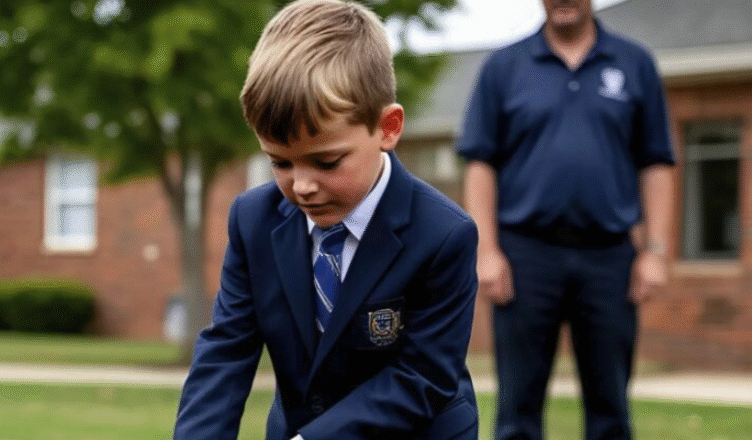Every day, the boy buried something behind the school. But what was later discovered was far more frightening than anything anyone could have imagined.
The school was located on the outskirts of an unremarkable little town. The building aged along with its students: cracked walls, rusty swings, dust in the corners, and a silence that became even more palpable on rainy days.
The place had long since lost its former glory, but it persisted – sustained by habits, children’s voices, and footprints on the stairs.
Matt Harris worked there – a crafts teacher and janitor. Tall, slightly stooped, he was one of those adults who notice when a child is suddenly even quieter than usual.
That’s how the new student caught his eye – a boy named Noah. Quiet, slight, with a serious expression that didn’t match his age of twelve. He arrived in the middle of the school year, spoke little, was always on time, and disappeared during the long recesses.
Every day, at exactly 1:20 p.m., Noah went behind the old gymnasium—a place no teacher visited anymore—and began digging dirt with a plastic spoon. Carefully, systematically. He wrapped something in a cloth or plastic bag and buried it, placing a twig next to it—like a marker.
At first, Matt thought it was a game. Perhaps the boy was imagining himself as a treasure hunter or archaeologist. But his movements were too serious.
Too precise. The holes were always the same depth, the objects were neatly wrapped, and his gaze—watchful, like an animal accustomed to hiding.
One day, Matt couldn’t take it anymore. When the schoolyard was empty, he went behind the gymnasium, found a marker, and began digging…
Continued in the first comment
Inside was a bag. Inside—an old stuffed animal, a photo of a young woman, and a crumpled banknote. Nothing valuable—and yet everything that matters.
From that moment on, Matt observed. Not out of curiosity—out of concern. He noted everything: times, number of holes, the boy’s behavior. He realized it wasn’t a game. It was a survival ritual. An attempt to preserve memories—fragments of a past that Noah could neither let go of nor share.
Matt spoke with the school psychologist—Ms. Taylor. She explained that Noah was living with a relative on his mother’s side. His mother had died, and his caregiver was a distant aunt. Formal terms, everything was in order: papers, housing, food. But the boy was too quiet, too controlled. As if he lived only within himself.
A week later, Child Protective Services came. Three people asked questions at school, spoke with Noah. He answered matter-of-factly, without emotion. At his aunt’s apartment—orderly, a tea kettle, food in the refrigerator. Everything seemed fine.
“Everything’s fine,” the officials said. “There’s no reason to intervene.”
But the next morning, Noah didn’t show up at school. His seat remained empty. Matt felt a tug in his heart—he knew what that meant.
A few hours later, with the help of Child Protective Services and the neighbors, they found the boy in the apartment. Alone. He was sitting in the corner with his backpack—inside it were the same things he had buried: a stuffed animal, a photograph, a piece of fabric, the wrapper from a candy.
—Are you alone?
—Yes. Auntie’s gone. She said she’d be right back.
—Have you eaten anything?
—A little. At certain times. I washed myself like I should. I did everything right.
He didn’t cry. He reported. A child living by his own law of survival.
After this incident, he was placed in a foster family—with Sarah and John Bailey, whose children were already grown. Their house smelled of bread, pictures and old clocks hung on the walls, and daisies bloomed in the garden.
The first few weeks were difficult. Noah hid food under his pillow, slept fully clothed, and checked his backpack every morning. He stuck to his rituals—not out of mistrust, but because he knew nothing else.
Matt visited him. First as a guest. Later, as someone Noah began to trust. One day, the boy asked quietly:
Did you know I buried things?
Yes.
Why didn’t you say anything?
Because I didn’t want to take away what was important to you. I waited until you were ready.
The boy nodded. Without words—but there was trust in that gesture.
Spring came. The apple trees were blooming. One warm day, Noah came to Matt, smiled, and said:
I don’t bury toys anymore. They’re on my shelf now. And the bill… here.
He pulled it out of his pocket and gave it to Matt.
Now it’s just money. I can buy juice with it. I don’t have to bury anything anymore.
Matt took the note like a sacred memento.
– Does that mean you’re really alive now?
– Now, yes.
He ran back to Hau
